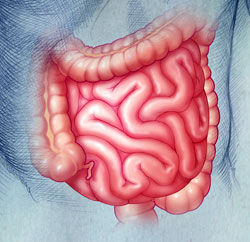 Lactose intolerance is an inability or difficulty digesting lactose, a type of sugar found in milk and dairy products. It occurs in patients without enough lactase, an enzyme normally found in the intestine that helps with the digestion of lactose. This condition is very common, particularly among African Americans, Native Americans, Asians, and people of Mexican or Jewish heritage.
Lactose intolerance is an inability or difficulty digesting lactose, a type of sugar found in milk and dairy products. It occurs in patients without enough lactase, an enzyme normally found in the intestine that helps with the digestion of lactose. This condition is very common, particularly among African Americans, Native Americans, Asians, and people of Mexican or Jewish heritage.
Secondary lactase deficiency is a condition caused by damage to the inner lining of the small intestine, often due to food poisoning. It is temporary and usually disappears as the intestine heals.
FAQs
Most people experience abdominal bloating, gas, cramps, and diarrhea within 30 minutes to two hours after consuming products containing lactose.
Your physician may be able to make a diagnosis simply by taking your medical history. However, there are several tests that may be needed to make a definitive diagnosis:
- Lactose Tolerance Test – After ingesting a test dose of lactose, the patient’s blood is checked over several hours to determine if blood sugar levels rise.
- Hydrogen Breath Test – After ingesting a test dose of lactose, the levels of hydrogen in the patient’s breath are monitored. High levels may indicate digestive problems.
- Stool Acidity Test – Stool samples are checked for their level of acidity.
- At-Home Test – Avoid dairy products for several days, then try drinking two large (14-16 oz.) glasses of skim or low-fat milk. If symptoms develop within four hours, lactose intolerance is most likely the cause.
If symptoms are mild, avoiding milk and other dairy products may be sufficient. However, if you are sensitive to even small amounts of lactose, you may need to start reading the labels of all processed and prepared foods. That’s because everything from bread and cereals to soups, salad dressings and lunchmeat can contain lactose – even some prescription and over-the-counter medications.
A second option is buying milk that contains lactase, the enzyme that helps digest lactose. Lactase drops and tablets are also available, as well as lactose-free products.
Calcium supplements provide a possible solution that should be discussed with your physician. Leafy green vegetables like broccoli, Chinese cabbage, collard greens, kale and turnip greens are all good sources of calcium. So are oysters, salmon, sardines, shrimp and tofu.